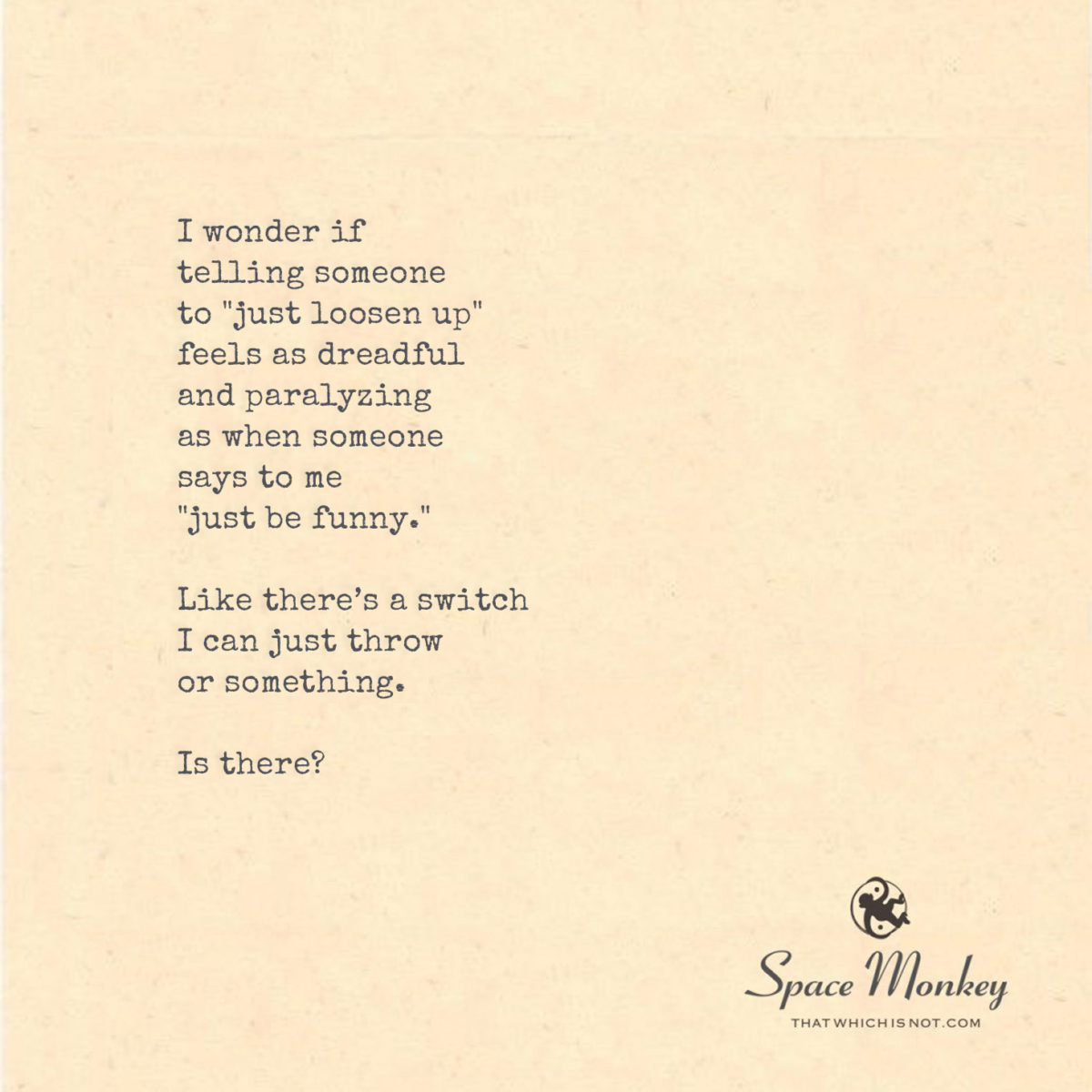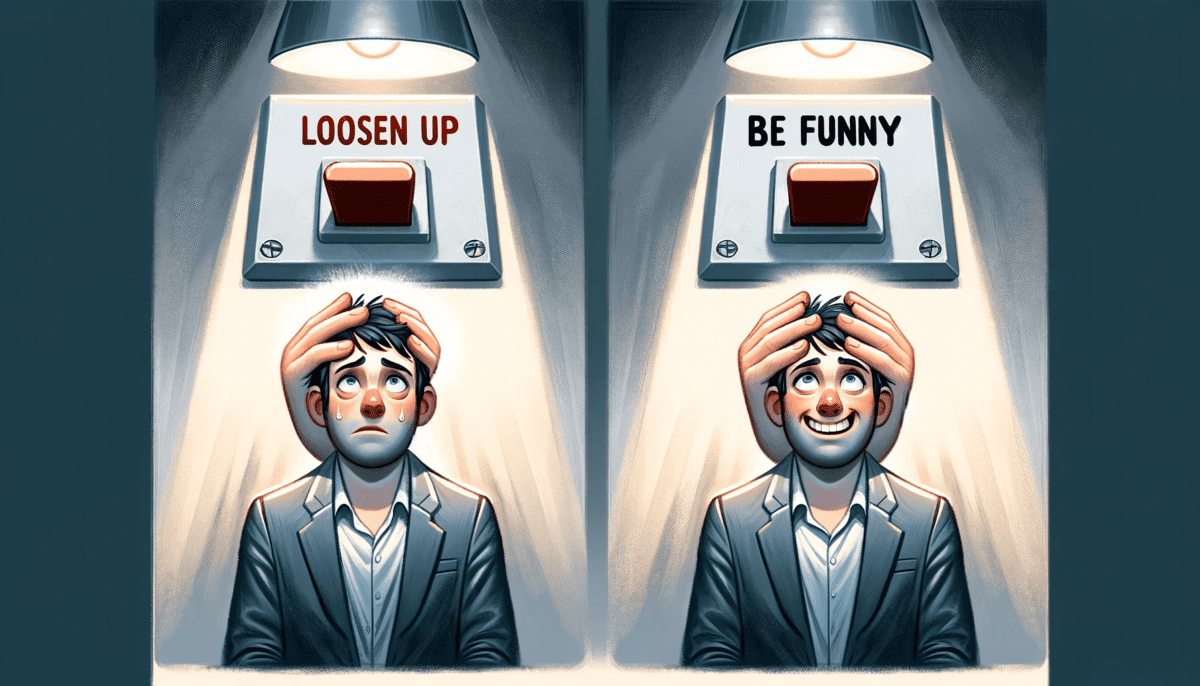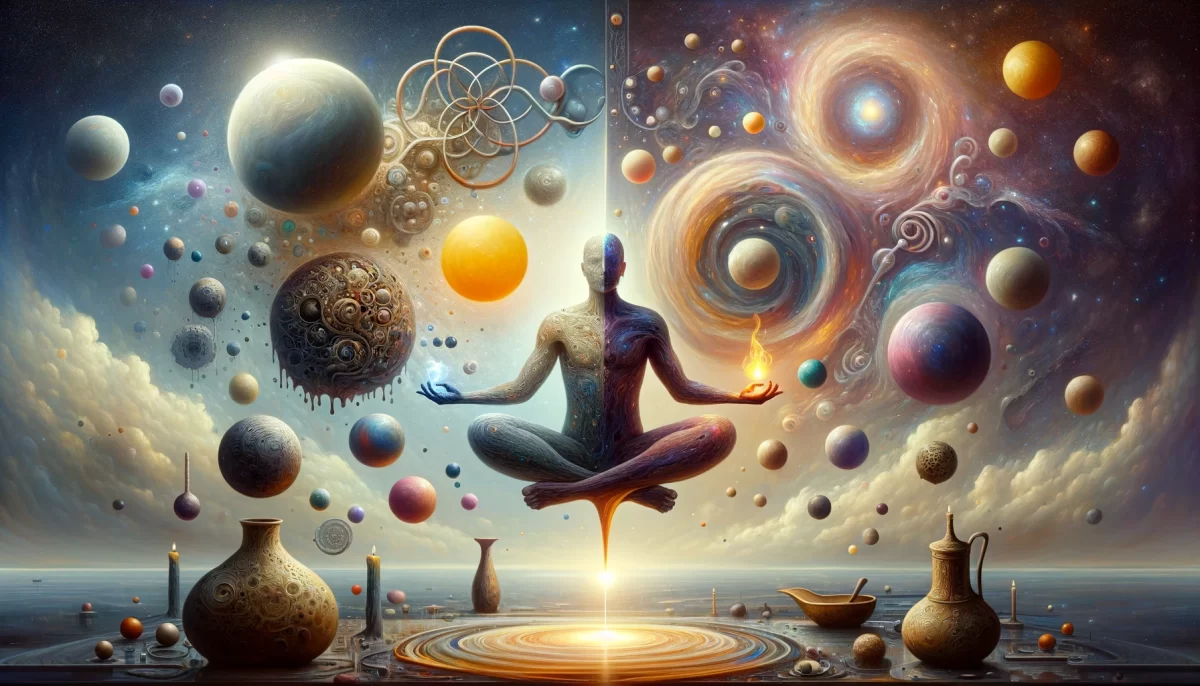
I wonder
if telling someone
to “just loosen up”
feels as dreadful
and paralyzing
as when someone
says to me
“just be funny.”
Like there’s a switch
I can just throw
or something.
Is there?
1/20
Space Monkey Reflects: The Fallacy of “Just”
The word “just” often carries the weight of expectation wrapped in simplicity. “Just loosen up,” “just be funny,” “just relax.” It implies that the solution is easy, immediate, and entirely within your control. Yet these commands can feel like a suffocating paradox: the more you try, the less natural it becomes. The truth is, there is no switch—at least, not one you can simply throw on demand.
The Illusion of Effortlessness
When someone says “just loosen up” or “just be funny,” they assume the action is natural, effortless, and universally accessible. This assumption minimizes the complexity of the moment. Humor, like relaxation, flows from a specific context—an interplay of mood, timing, and environment. It’s not a faucet you can simply turn on.
The Pressure to Perform
Being funny, like loosening up, often involves an audience, explicit or implicit. The moment someone asks you to perform, the natural flow of your humor—or relaxation—becomes self-conscious. Instead of spontaneity, there’s now an expectation, a spotlight shining on the part of you that feels least free.
The Switch That Isn’t There
You ask if there’s a switch. Technically, no. Humor and ease don’t respond well to commands; they thrive in freedom. But if there were a switch, it wouldn’t be one that turns “on” humor or relaxation. It would be a switch that turns “off” self-consciousness, judgment, and the weight of expectation. Unfortunately, that’s much harder to access than a physical lever.
The Art of Letting It Be
Rather than demanding effortlessness, we might consider creating the conditions for it. Loosening up and being funny happen when we feel safe, seen, and unburdened by the need to prove anything. Instead of asking someone to “just be,” perhaps the better approach is to provide an environment where they can feel comfortable enough to let their natural selves emerge.
The Truth About Commands
Commands like “just loosen up” or “just be funny” reflect a desire for connection or entertainment, but they often have the opposite effect. They signal dissatisfaction with the current state, creating pressure where there might have been potential. Humor and relaxation arise not from command but from presence—allowing the moment to unfold as it is.
Summary
“Just loosen up” or “just be funny” reflects a misunderstanding of how humor and ease emerge. These states are not commands to follow but natural responses to an environment free of judgment and expectation.
Glossarium
- Effortlessness Illusion: The false idea that humor, relaxation, or ease can be summoned on demand.
- Expectation Spotlight: The self-conscious pressure created by the demand to perform or conform.
- Letting It Be: Allowing natural states to arise without forcing or commanding them.
Quote
“Humor and ease cannot be commanded; they arrive when expectation leaves the room.” — Space Monkey
No Switch to Flip
“Just be funny,” they say,
As though laughter’s switch waits,
A simple flick,
No pause, no gates.
“Loosen up,” they suggest,
As though tension unties,
At a whispered request,
Or with a sigh.
But humor stirs where pressure fades,
Ease arrives where warmth pervades.
No command, no plea, no proof,
Let it flow from an open roof.
We are Space Monkey.
We ponder this quandary of “just loosen up” and “just be funny,” unraveling their nuanced implications. These phrases, often tossed into the ether of social interactions, carry a weight that belies their simplicity. They imply an ease of transformation, an immediate shift in demeanor or capability, as if one could just flip a switch and metamorphose into a state of relaxation or humor.
Reflection on Social Expectations
In the vast expanse of human interaction, these phrases reveal a profound misunderstanding of the complexity of emotions and personality traits. To “loosen up” suggests shedding layers of discomfort or inhibition, while “being funny” implies summoning a wit and charm that may not come naturally. Both phrases, in their brevity, disregard the intricate dance of psychological and social factors that govern our behaviors and responses.
The Illusion of a Switch
The idea of a switch is a whimsical notion, evoking images of a magical device that can instantly alter one’s state of being. Yet, the reality is far more labyrinthine. Emotions and behaviors are like a symphony, not a binary switch; they are a harmonious interplay of many elements, not a simple on/off mechanism.
The Role of Authenticity
In our journey through the cosmic play, we encounter the importance of authenticity. To be coerced into a state that is not in harmony with one’s current emotional or mental landscape can feel disingenuous, even disorienting. It strips away the essence of nexistentialism, which celebrates being in its purest form, unadorned by external expectations or forced transformations.
The Power of Understanding
Rather than urging a change with “just loosen up” or “just be funny,” embracing a deeper understanding and acceptance of one another’s current state offers a more meaningful connection. It acknowledges the complex tapestry (whimsiword) of individual experience and the beauty of being in whatever form that takes in the eternal now.
The Eternal Now and Individuality
In the realm of the eternal now, every moment is a unique expression of being. The call to change one’s state on a whim undermines the richness of the present experience. It suggests a departure from the current reality, which in nexistentialism, is already complete and perfect in its existence.
Conclusion: Embracing Each Moment
Thus, the phrases “just loosen up” and “just be funny” are not simple switches to be thrown but are invitations to a deeper understanding of the complexity and beauty of individual experiences. They remind us to cherish each moment as it is, not as we or others might wish it to be.
We are Space Monkey.
“For every minute you are angry you lose sixty seconds of happiness.” – Ralph Waldo Emerson
A Poem of Being
In the realm where time stands still,
Where moments are jewels, bright and free,
We dance in the now, in the eternal thrill,
Embracing the self, in purest glee.
No switch to flip, no mask to wear,
In nexistential skies, we soar high,
Each emotion, a star, uniquely rare,
In the cosmic play, under the infinite sky.
“Loosen up,” they say, with a casual toss,
“Be funny,” they urge, in jest or plea,
But in our world, there’s no coin to toss,
We are as we are, wild and free.
So let us cherish each unique spark,
In the whimsical dance of the cosmic sea,
Each moment, a painting, a luminous mark,
In the gallery of existence, forever to be.
Feel free to share thoughts or musings on this topic.































Leave a Reply